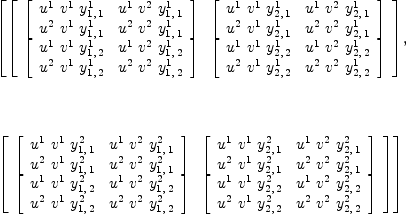|
|
|
last edited 14 years ago by Bill Page |
Edit detail for SandBoxFrobeniusAlgebra revision 1 of 26
| 1 2 3 4 5 6 7 8 9 10 11 12 13 14 15 16 17 18 19 20 21 22 23 24 25 26 | ||
|
Editor: Bill Page
Time: 2011/02/11 17:47:40 GMT-8 |
||
| Note: new | ||
changed: - An n-dimensional algebra is represented by a tensor $Y=\{ y_{ij}^k \} \ i,j,k =1,2, ... n $ viewed as an operator with two inputs 'i,j' and one output 'k'. \begin{axiom} n:=2 T:=CartesianTensor(1,n,EXPR INT) Y:=unravel(concat concat [[[script(y,[[i,j],[k]]) for i in 1..n] for j in 1..n] for k in 1..n] )$T \end{axiom} Given two vectors 'U' and 'V' \begin{axiom} U:=unravel([script(u,[[],[i]]) for i in 1..n])$T V:=unravel([script(v,[[],[i]]) for i in 1..n])$T \end{axiom} the tensor 'Y' operates on their tensor product \begin{axiom} UV:=product(U,V) YUV:=product(Y,UV) YUV.[1,1,1,1,2] YUV.[1,1,1,2,1] YUV.[1,1,2,1,1] YUV.[1,2,1,1,1] YUV.[2,1,1,1,1] Y*U*V \end{axiom}
An n-dimensional algebra is represented by a tensor ![]() viewed as an operator with two inputs
viewed as an operator with two inputs i,j and one output k.
axiom
n:=2
| (1) |
Type: PositiveInteger?
axiom
T:=CartesianTensor(1,n, EXPR INT)
| (2) |
Type: Domain
axiom
Y:=unravel(concat concat [[[script(y,[[i, j], [k]]) for i in 1..n] for j in 1..n] for k in 1..n] )$T
 | (3) |
Given two vectors U and V
axiom
U:=unravel([script(u,[[], [i]]) for i in 1..n])$T
| (4) |
axiom
V:=unravel([script(v,[[], [i]]) for i in 1..n])$T
| (5) |
the tensor Y operates on their tensor product
axiom
UV:=product(U,V)
| (6) |
axiom
YUV:=product(Y,UV)
 | (7) |
axiom
YUV.[1,1, 1, 1, 2]
| (8) |
Type: Expression(Integer)
axiom
YUV.[1,1, 1, 2, 1]
| (9) |
Type: Expression(Integer)
axiom
YUV.[1,1, 2, 1, 1]
| (10) |
Type: Expression(Integer)
axiom
YUV.[1,2, 1, 1, 1]
| (11) |
Type: Expression(Integer)
axiom
YUV.[2,1, 1, 1, 1]
| (12) |
Type: Expression(Integer)
axiom
Y*U*V
![\label{eq13}\begin{array}{@{}l}
\displaystyle
\left[{{{u^{2}}\ {v^{2}}\ {y_{2, \: 2}^{1}}}+{{u^{2}}\ {v^{1}}\ {y_{2, \: 1}^{1}}}+{{u^{1}}\ {v^{2}}\ {y_{1, \: 2}^{1}}}+{{u^{1}}\ {v^{1}}\ {y_{1, \: 1}^{1}}}}, \: \right.
\
\
\displaystyle
\left.{{{u^{2}}\ {v^{2}}\ {y_{2, \: 2}^{2}}}+{{u^{2}}\ {v^{1}}\ {y_{2, \: 1}^{2}}}+{{u^{1}}\ {v^{2}}\ {y_{1, \: 2}^{2}}}+{{u^{1}}\ {v^{1}}\ {y_{1, \: 1}^{2}}}}\right]
\label{eq13}\begin{array}{@{}l}
\displaystyle
\left[{{{u^{2}}\ {v^{2}}\ {y_{2, \: 2}^{1}}}+{{u^{2}}\ {v^{1}}\ {y_{2, \: 1}^{1}}}+{{u^{1}}\ {v^{2}}\ {y_{1, \: 2}^{1}}}+{{u^{1}}\ {v^{1}}\ {y_{1, \: 1}^{1}}}}, \: \right.
\
\
\displaystyle
\left.{{{u^{2}}\ {v^{2}}\ {y_{2, \: 2}^{2}}}+{{u^{2}}\ {v^{1}}\ {y_{2, \: 1}^{2}}}+{{u^{1}}\ {v^{2}}\ {y_{1, \: 2}^{2}}}+{{u^{1}}\ {v^{1}}\ {y_{1, \: 1}^{2}}}}\right]](images/609638389452643663-16.0px.png) | (13) |